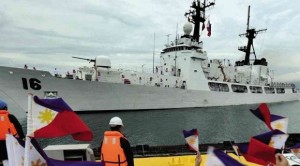
The BRP Ramon Alcaraz, which the Philippines acquired from the US after the US Coast Guard decommissioned it in March 2012. Visiting French Navy Cmdr. Frédéric Daumas said the Philippines need not put its eggs in one basket as it rebuilds its defense capability, or rely on hand-me-downs from the Americans. FILE PHOTO
MANILA, Philippines—This visiting French Navy commander says the Philippines need not put its eggs in one basket as it rebuilds its defense capability, or rely on hand-me-downs from the Americans.
Cmdr. Frédéric Daumas said on Wednesday night Aquino administration might consider looking at other sources of military equipment other than its traditional allies such as the United States.
The commanding officer of the frigate Prairial said in an interview aboard the multimission maritime surveillance vessel docked at the port of Manila he was hopeful the Philippines would give the French a shot at supplying vessels to its naval force, one ill-equipped to protect the country’s vast coastline and economic zone.
“It will be a good idea to have procurements from other countries,” he said, not just from the United States. “It’s not to say that they are not our best ally, because they are the best ally of everybody. But you don’t need to have only one ally, and you don’t need to put all your eggs in the same basket,” Daumas said.
He made the statement when asked what a ship like the Prairial could offer the Philippines compared to one from, say, the United States.
The Philippine Navy’s newest frigates, the BRP Gregorio del Pilar and BRP Ramon Alcaraz, were acquisitions from the United States, both refitted as Navy ships after decades of use by the US Coast Guard.
“I think you already have a lot of American equipment. Most of your ships are coming from the American Navy, second-hand ships. I think it is good to have different ways of working, different procedures, different organizations, and if you have only one major partner, probably you deprive yourself of having a variety of points of view, a variety of partnerships,” he said.
He said the Prairial was designed for low- or medium-intensity missions. “It’s not a very big cruiser or a destroyer but is very well-adapted for what we have to do and maybe for what the Filipino Navy would like to do in the coming years to patrol more and more in the islands and regionally,” said Daumas.
Based in the French Polynesian island of Tahiti, the Prairial is here on a five-day goodwill visit that ends Friday. Among a fleet of six sister ships of the French Navy, the vessel arrived in Manila on Monday. It last dropped anchor here nine years ago.
The Philippine Navy was expected to hold basic at-sea exercises with some of the 94 French sailors of the Prairial Friday, pursuing a 15-year-old aide-mémoire signed between the two naval forces “to cooperate, to better know each other, to exchange information,” said Daumas.
Also part of the mission, he said, was to show the Philippines what the Prairial, a 94-meter long-range, diesel-powered vessel, could do and how it could fit into the country’s needs. He said France was among nations now bidding to supply ships to the Philippines, but conceded he was not privy to the progress in talks.
What is being offered to the Philippines, he said, is an upgraded version of the 22-year-old vessel, including a better radar system and an expanded hangar to accommodate more embarked helicopters. Currently, the frigate could carry one helicopter—the French-made Alouette III.
Manila is the second stop in the Prairial’s fourth-month deployment in the Pacific, which began in Guam. It is also scheduled to visit China, Japan and Korea, with the tour culminating in the ship’s participation in the 20-nation Rim of the Pacific Exercise in Hawaii later this year.
Daumas said the French Navy’s port visits and engagements in international drills were part of the common goal of protecting freedom of navigation in the Pacific area, an issue also of high concern for the Philippines amid maritime disputes with China.
“The freedom of navigation is something which is very important, which comes from the Middle Ages and which needs to go on and on. So, of course, we do not want to escalate any crisis or to create any diplomatic incident, but we want to reaffirm that we apply the United Nations Convention on the Law of the Sea and that with all our partners, we have a common understanding on what needs to be done,” Daumas said.
RELATED STORIES
‘EDCA will make make PH the biggest US military base in the world’
PH, Japan boost defense ‘partnership’ amid sea row with China

